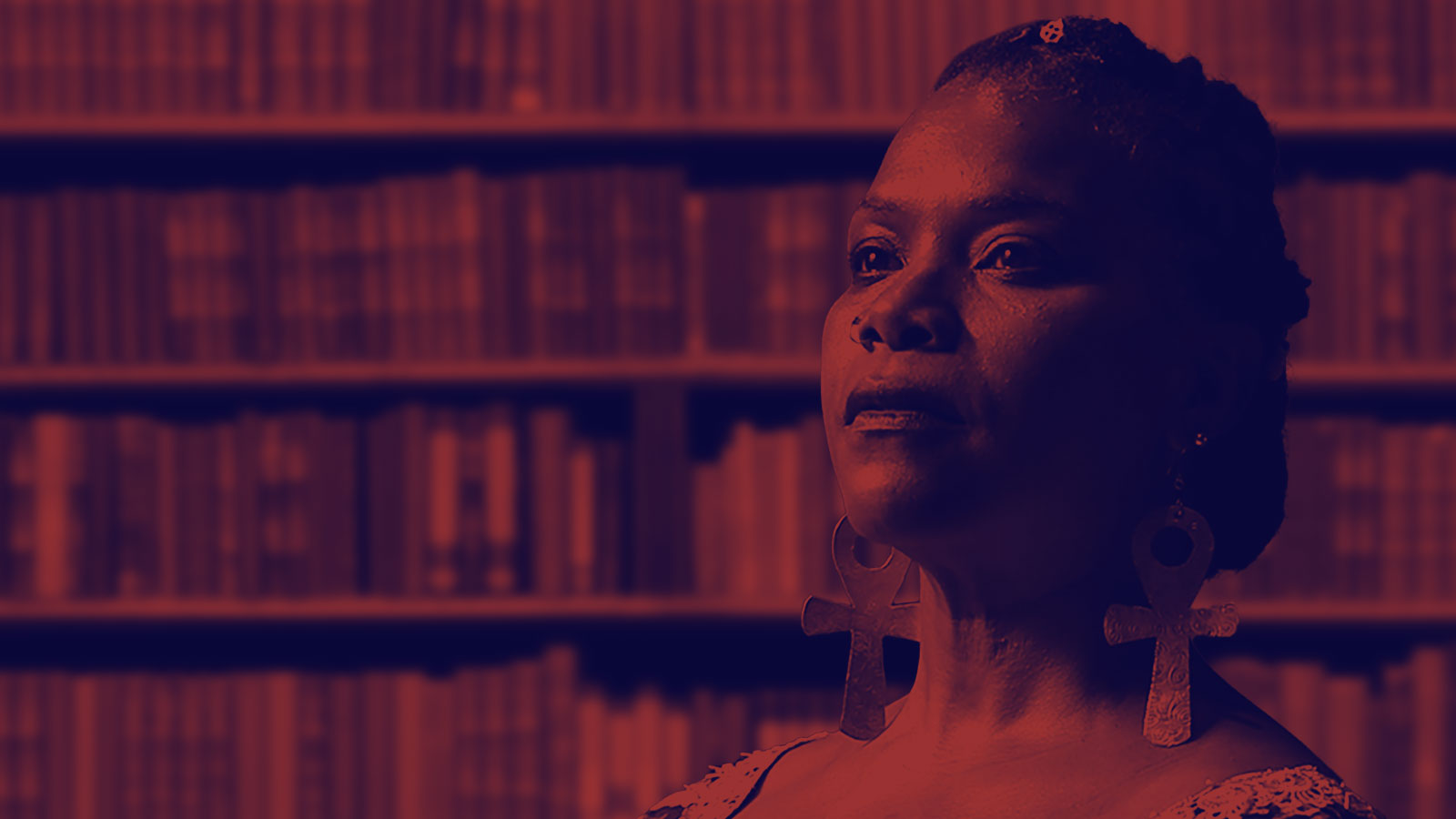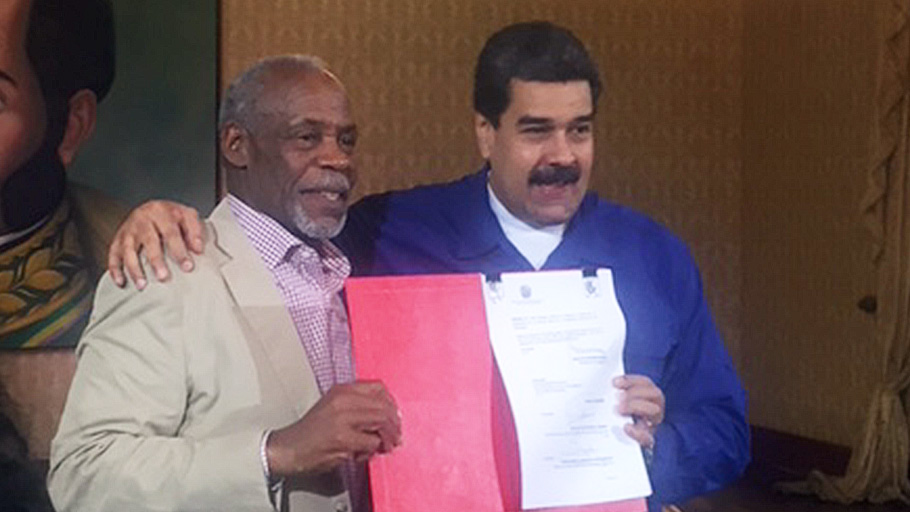
President Maduro and Danny Glover at the signing of the UN decree at the Casa Amarilla in Caracas.
Pres. Maduro to host International Reparations Conference
“Soy Afro, mi gente, Soy Afro, Afrodescendiente”
This song of pride to be an Afro descendant in Venezuela became the song of all who joined them on this journey to uphold the Bolivarian message.
Afro descendants from the US, Uruguay, Brazil, Puerto Rico, Peru, Bolivia, Argentina, Haiti, France, St. Vincent’s, Barbados, Colombia and Ecuador participated in a Forum of Afro descendants and Neoliberalism in Latin American and the Caribbean. Danny Glover, Actor/Activist and UN ambassador for the Decade of People of African Descent, was one of the special guests who attended the gathering.
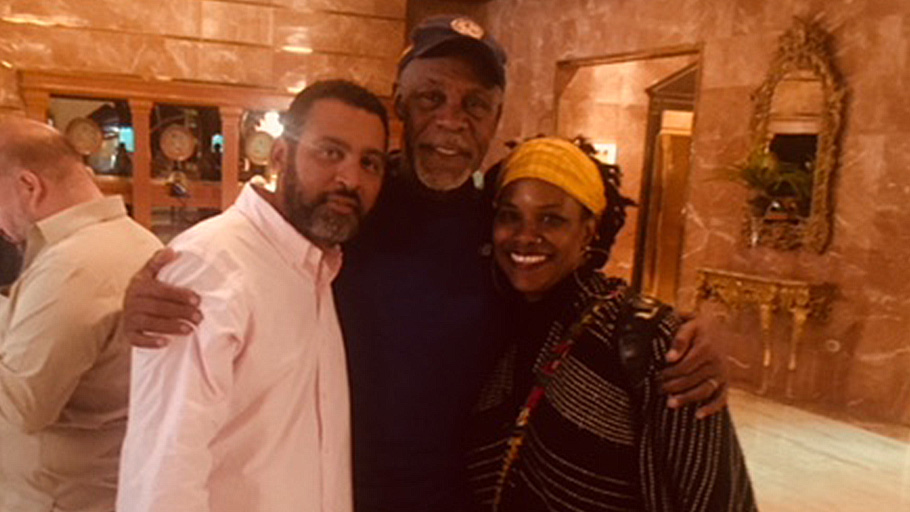
Miguel Pereira AfroUruguayan leader with Danny Glover and myself on our last day in Caracas
The purpose of the visit was to see what was happening first hand in Venezuela and to witness President Maduro’s signing of the UN decree for the Decade of People of African descent. President Maduro did not hesitate in naming Reparations as one of the key issues he will discuss in Venezuela. Before the event ended, he committed to hosting an International Committee for the Reparations of Afro Descendants against Enslavement, Racism and Imperialism in May.
The Venezuela we saw and felt is a Venezuela of Afro/Black faces that continue rising in the midst of the struggle. Yes, there is a crisis that the economic blockade has brought upon them but they continue moving in that Maroon Warrior light because the message of inclusion of their voices in Venezuela’s Bolivarian process feeds their commitment.
We are in the Decade of People of African Descent. Not many governments/states have done concrete acts to support the decade and its three key themes–justice, development and recognition/reparations. To be present with other Afro descendants from the Americas made this act not just about Venezuela but about all of us.
Afro Venezuelans live in constant fear of their lives. To be black in Venezuela is to be burned in the streets and killed just for being black. We heard stories from young people who cover themselves up for fear of being recognized as black.
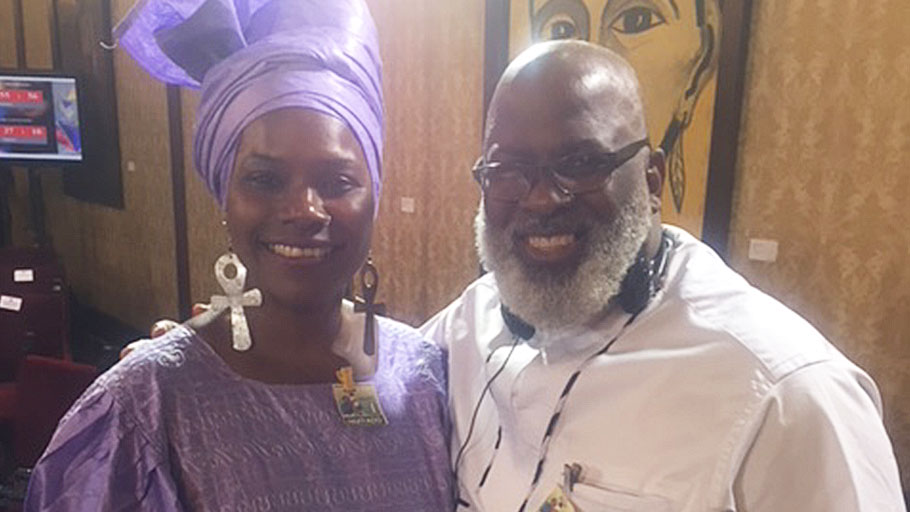
Yvette with Baba Akinyele Umoja of Georgia State University and MXGM at the signing of the UN decree.
We were received by our Afro Venezuelan brothers and sisters who embraced us with their deep connection to the motherland. We saw Africa in their faces. We felt Africa in the drumbeat–a progressive movement and a thought process that we do not always hear about coming from Venezuela. But that is what we saw.
I facilitated the Recognition and Reparations Working group with Afro Venezuelan leader Manuel Salcedo. Here are some of the proposals that came out of this discussion;
Table: Recognition and Reparations
Proposals:
- Develop a system of articulation to recognize ourselves from community, in addition to reconstructing our spirituality.
- Strengthen Bolivarian diplomacy as a tool for the reengaging the community.
- Create educational institutions that deepen the contributions made by people of African descent.
- Recognition among people of African descent is necessary and important as the main problem to overcome.
- Reparations must be a political process to change the realities of Afro-descendant populations.
- For recognition, strategies such as the creation of books that allow the change of perception and / or paradigms towards the Afro-descendant population are necessary.
- It must be understood that the paradigm of domination must be changed in order to repair, assuming what it means to open all transatlantic trafficking records in order to promote profound changes with the support of the states that began this process, such as Venezuela, Bolivia, Brazil and Ecuador. .
- Press the States of America to assume the decade and support it concretely. In the case of Venezuela, we demand that President Nicolas Maduro take a concrete position that allows the concrete application of public policies for the Afro-descendant population.
- Reparations should not limit the monetary value but also include improvements in the quality of life (education, health, and housing, among others).
- Understand recognition beyond the color of the skin.
- Eliminate the stigma of what it means to be black and not associate it with crime.
- Support and reinforce the institutions that exist for the recognition and reparations of people of African descent.
- Clarify concepts and terms so as not to confuse (bleach) with words such as mulato, meztiso in the option of censuses for recognition and self-recognition of African descent.
- Use the resources created by other Afro-descendant movements in the world to influence the different media policies of the Afro-descendant population in Venezuela,
- See our great contributions as an element to raise our self-esteem, for example the upbringing of Simón Bolívar by Afro-descendant women.
- All initiatives for recognition and repairs must have their own budget.
- We have to clarify the terms, strengthen the recognition by disseminating the history that has been made invisible.
- We urge the states that have not yet taken the decade to begin the process for its implementation and execution. And inclusion with specificity in the constitutions of the States.
- The Catholic Church should be questioned in the reparations process.
- Reparations and recognition is a political process.
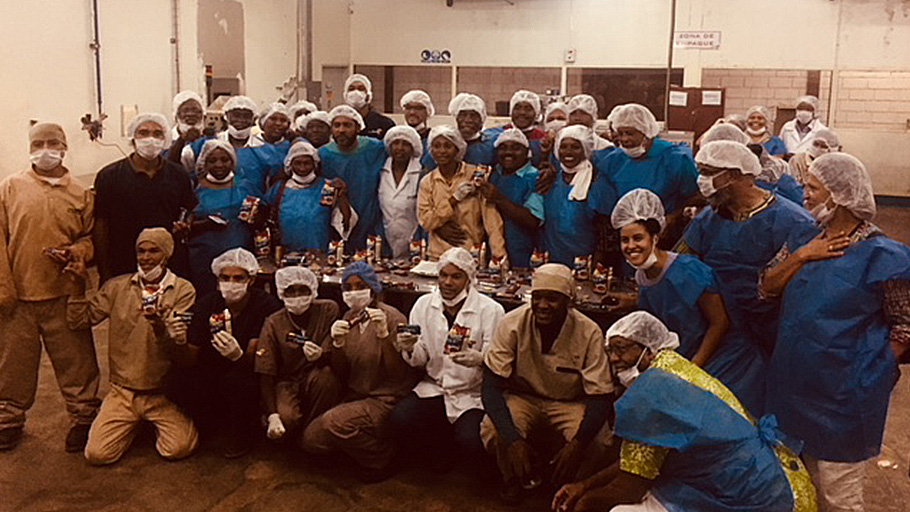
Afro descendant visit to the Chocolate Plant in Barlovento. The plant is managed and run by Afro Venezuelans.
The following day we visited the Guillermo Rivas Chocolate Plant, ‘El Cimarron’. This plant is run by the people of Miranda in Barlovento. We toured the plant and learned more about the production and the process of this delicious chocolate.
Our next stops were the housing community in Caucagua. It has 2300 apartments, 114 buildings and 5 educational institutions. The pride in having their own space and creating their own agenda was impressive. I met with a few of the ‘Cumbre de Mujeres Cimarronas; Hogares de la Patria.’ The women shared the leadership trainings and the ongoing work to bring awareness to the community.
We then visited the ‘Centro de Estudios Inegrales de Barlovento y de la Diaspora in San Jose. There we saw the extensive work of AfroTV to share the truth of these communities. We also met the women of the CEIBA program who make their own laundry detergent, dishwashing liquid and disinfectant. They also make pampers out of cloth. It is absolutely impressive what they are doing to fill in the gaps imposed by the blockade.
Our final stop was Curiepe. It was here that I felt more than any place the Maroonship of the people, the clarity in their identity as Africans and the unconditional fight to keep the Bolivarian message going.
Overall, the visit to Venezuela brought a clearer understanding to me as to what is happening in the country but, most importantly, it brought us closer to seeing ourselves in the struggle of the Afro Venezuelan community.


